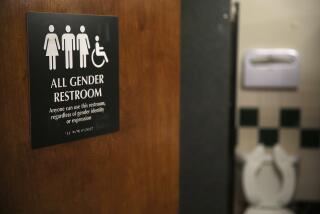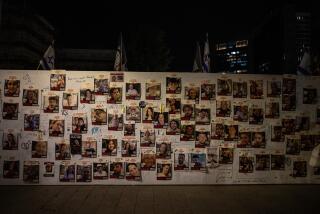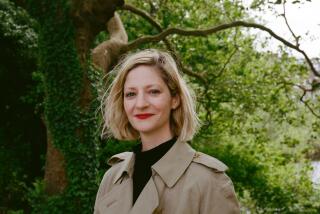BOOK REVIEW : Terrorist Women: Muddled Thoughts of Maternal Ideals : SHOOT THE WOMEN FIRST: Inside the Secret World of Female Terrorists <i> by Eileen MacDonald</i> ; Random House; $20; 219 pages
- Share via
We women don’t make up more than 10% of the world’s judges and law enforcement officers but, by God, close to half of the terrorists are women. It’s hard to imagine which feminist group would point with pride to this female representation among the grenade-throwers, hijackers, car-bombers and knee-cappers of the world.
The first book to deal exclusively with women terrorists, “Shoot the Women First” may not precisely praise this group, but its author, British journalist Eileen MacDonald, at least seeks to understand it.
MacDonald wanted to find out what these 20-some violently political women had in common and to answer the question, Are women more dangerous than men? (“Shoot the women first” is reputedly an order given to Germany’s anti-terrorist squad.)
MacDonald is all over the map--Palestine, Northern Ireland, Spain, Italy, Germany-diligent in tracking down women to interview. She gives us complicated women and tells the violent things they’ve done--blowing up planes, assassinating bank presidents, setting off bombs in shopping malls, ambushing bus loads of soldiers--but doesn’t supply a unifying thread or convincing conclusions.
The author’s own story might have worked as an organizing principle. She put herself in danger by talking to these women, some of whom suspected she was a police agent. We wonder what set her on the trail.
“I had always been interested in how women succeeded in what were considered to be male-dominated environments,” she explains, and the reader gets a little nervous about what the author believes constitutes success.
It’s odd that MacDonald’s book lacks tension. Part of the blame rests with the fact that many of the people she interviewed were, so to speak, retired. Those currently active are in the Palestine Intifada, the Irish Republican Army and the Basque movement. These women stand out in the story because they are fighting, as they see it, a civil war to erase long-standing injustice.
Kim Hyon Hui, a North Korean woman who was responsible for 115 deaths when she set a bomb on a South Korean airliner, couldn’t be any sort of feminist heroine. This beautiful and delicate woman, raised singing “Hack to Death the Capitalist Dogs,” was just following orders. Aiming to please her North Korean bosses, she got off when Korean Air Lines flight 858 made a stop, having planted a ticking bomb inside a radio in the overhead compartment.
The West German and Italian women seem to MacDonald to have muddled motives, primarily anger at authority. She finds the most interesting group closest to home. The women of the Irish Republican Army don’t much like what they’re doing, but can’t imagine not doing it. “No one hates this war more than us,” says one. “It is our country, and we hate the bloody war.”
MacDonald’s theory that the women terrorists hold maternal feelings for the cause is pretty hard to swallow. Khaled, who now works in a refugee camp near Damascus, remembers watching a little girl playing in the airport lounge before they boarded: the girl with her toys, Khaled with her grenades and gun. It worried her that the girl might die. “Then,” she says, “I remembered all the countless thousands of Palestinian children in the refugee camps. They were depending on me to tell the world about them.”
It’s a big stretch from that to MacDonald’s conclusion: “One can begin to see why a woman fighter should be more feared than a man: she views her cause as a surrogate child. . . .” MacDonald turns out to be guilty of the same anti-feminist thinking she criticizes: the stereotype that a woman doesn’t get angry on behalf of a cause; she has to be the mother bear protecting her cub.
In fact, MacDonald’s interviews show that women can find ecstasy in being immersed in a cause. Their attachments to fellow cadre members are intense, and the drama of their lives is heightened by the possibility of being captured, tortured or even killed.
In her conclusion, MacDonald makes a rushed, halfhearted attempt to link the women to a common past. A few lost one parent when they were young, she finds, but the majority were “disturbingly normal.” She quotes the head of Germany’s anti-terrorist squad, who states with weird pride, “German women are more liberated and more self-aware than Italian and French women. . . .”
Then she writes, equally bizarrely, “German women have thrown off the shackles of the traditional woman in society and have realized that there is no reason why they should not be violent.” Are we supposed to get up and cheer, “Go, fight, win, German terrorist women”?
Instead of drawing her own conclusions, MacDonald keeps going back to one German anti-terrorist who definitely believes that the female of the species is deadlier than the male. Really? With a grenade in your hand, a package with a bomb under your arm, and a gun tucked in your belt, does it really matter whether you are female or male?
More to Read
Sign up for our Book Club newsletter
Get the latest news, events and more from the Los Angeles Times Book Club, and help us get L.A. reading and talking.
You may occasionally receive promotional content from the Los Angeles Times.








